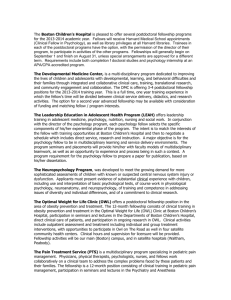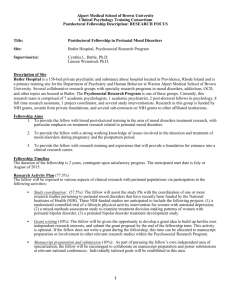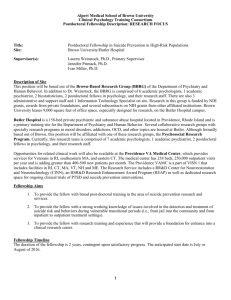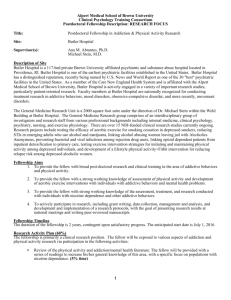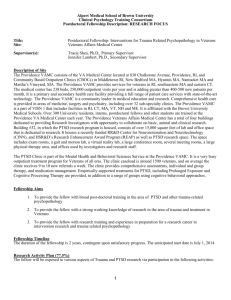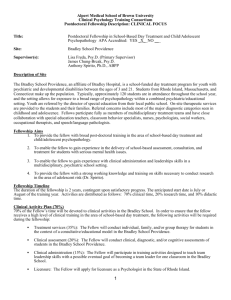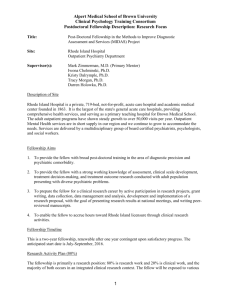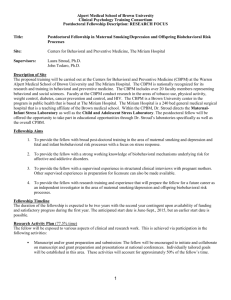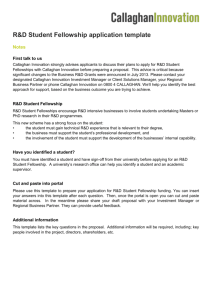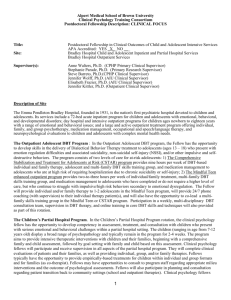Counseling & Psychological Services (CAPS)
advertisement
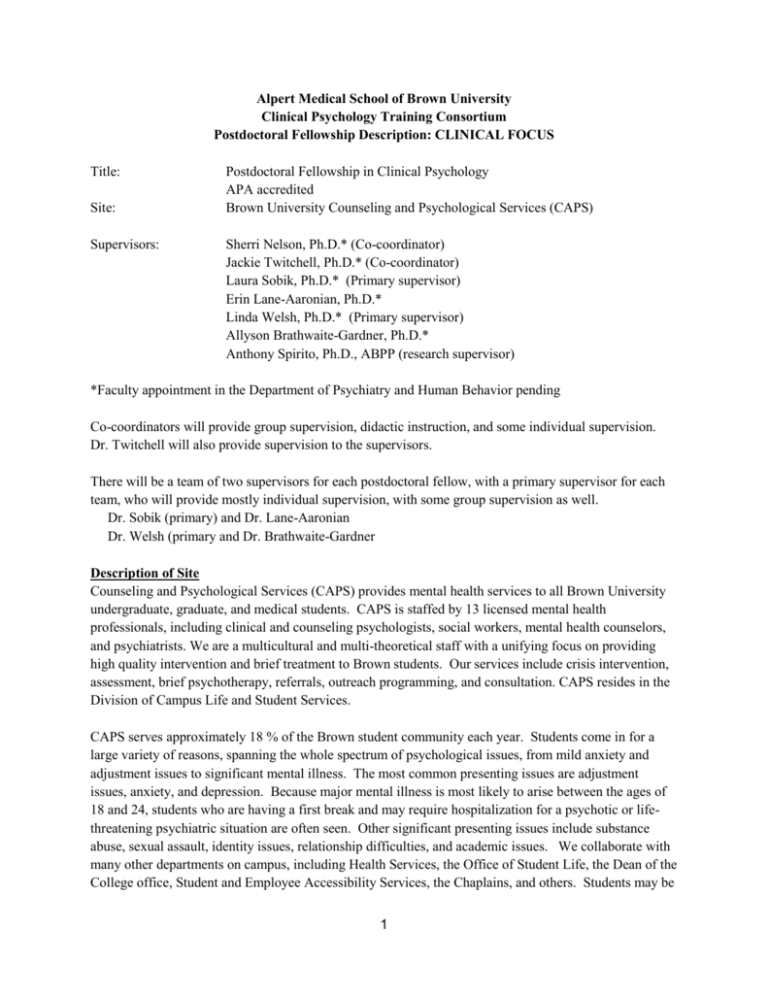
Alpert Medical School of Brown University Clinical Psychology Training Consortium Postdoctoral Fellowship Description: CLINICAL FOCUS Title: Site: Supervisors: Postdoctoral Fellowship in Clinical Psychology APA accredited Brown University Counseling and Psychological Services (CAPS) Sherri Nelson, Ph.D.* (Co-coordinator) Jackie Twitchell, Ph.D.* (Co-coordinator) Laura Sobik, Ph.D.* (Primary supervisor) Erin Lane-Aaronian, Ph.D.* Linda Welsh, Ph.D.* (Primary supervisor) Allyson Brathwaite-Gardner, Ph.D.* Anthony Spirito, Ph.D., ABPP (research supervisor) *Faculty appointment in the Department of Psychiatry and Human Behavior pending Co-coordinators will provide group supervision, didactic instruction, and some individual supervision. Dr. Twitchell will also provide supervision to the supervisors. There will be a team of two supervisors for each postdoctoral fellow, with a primary supervisor for each team, who will provide mostly individual supervision, with some group supervision as well. Dr. Sobik (primary) and Dr. Lane-Aaronian Dr. Welsh (primary and Dr. Brathwaite-Gardner Description of Site Counseling and Psychological Services (CAPS) provides mental health services to all Brown University undergraduate, graduate, and medical students. CAPS is staffed by 13 licensed mental health professionals, including clinical and counseling psychologists, social workers, mental health counselors, and psychiatrists. We are a multicultural and multi-theoretical staff with a unifying focus on providing high quality intervention and brief treatment to Brown students. Our services include crisis intervention, assessment, brief psychotherapy, referrals, outreach programming, and consultation. CAPS resides in the Division of Campus Life and Student Services. CAPS serves approximately 18 % of the Brown student community each year. Students come in for a large variety of reasons, spanning the whole spectrum of psychological issues, from mild anxiety and adjustment issues to significant mental illness. The most common presenting issues are adjustment issues, anxiety, and depression. Because major mental illness is most likely to arise between the ages of 18 and 24, students who are having a first break and may require hospitalization for a psychotic or lifethreatening psychiatric situation are often seen. Other significant presenting issues include substance abuse, sexual assault, identity issues, relationship difficulties, and academic issues. We collaborate with many other departments on campus, including Health Services, the Office of Student Life, the Dean of the College office, Student and Employee Accessibility Services, the Chaplains, and others. Students may be 1 seen for routine or urgent visits. Because we have a short term therapy model (7 sessions maximum per year), we make many referrals to providers in the immediate community. We provide 24 / 7 /365 crisis coverage. We also do outreach in a variety of forms, including workshops, presentations, and trainings, as well as on site groups (e.g. students returning from medical leave, OCD, chronic medical conditions, sexual assault survivors). Fellowship Aims 1) To provide the fellow with broad postdoctoral training in the area of young adult mental health services in a university setting using multiple modalities of service, including brief psychotherapy. 2) To enable the fellow to gain experience working with a multidisciplinary team by providing individual and group clinical services to undergraduate, graduate and medical students at Counseling and Psychological Services (CAPS). 3) To provide the fellow with a strong working knowledge of research in the area of young adult depression and suicidality. The intent of the fellowship is to provide an entry-level professional with the type of supervised experience necessary for licensure as a psychologist. While it is the responsibility of the fellow to understand and track the licensing regulations and requirements for whichever state licensure is sought, the fellowship is designed to meet or exceed the necessary clinical activities and supervision required for licensure in Rhode Island. Fellowship Timeline The duration of the fellowship is one year, contingent upon satisfactory progress. The anticipated start date is September 1, 2106. Clinical Activity Plan (70%) ● ● The fellow will spend 60% of their time on: ○ direct clinical service, which will include intakes, follow up appointments, urgent and crisis assessments, brief psychotherapy and referral, and group psychotherapy. ○ outreach activities, which will include participation in student orientations, workshops, presentations on relevant topics (e.g. test anxiety, stress management). ○ experience in specific clinical areas such as eating disorders, sexual assault, and suicide risk reduction, as time allows. The fellow will spend 10% of their time involved in staff meetings, and administrative activities (e.g. clinical notes). Research Activity Plan (20%) ● The fellow will be allotted one day per week for research with Dr. Anthony Spirito and other faculty in the Department of Psychiatry and Human Behavior whose clinical research focuses on adult and adolescent suicide prevention and intervention. Dr. Spirito is the Director of the 2 Division of Clinical Psychology, Department of Psychiatry and Human Behavior in The Warren Alpert Medical School. The fellow would be involved in activities such as literature review, grant preparation, and manuscript collaboration with Dr. Spirito and colleagues. One of the likely goals would be preparation of a grant application for spring 2016 that focuses on suicide prevention in young adults in the university setting. Didactics (10%) Postdoctoral Seminars: The fellow will participate in postdoctoral seminars through the Brown Postdoctoral Training Program. ● Mandatory Didactics: ○ Core Seminars (1.5 hours per month). ○ DPHB Academic Grand Rounds (1.25 hours per month). ○ Clinical Ethics (1.0 hours per month). ● Periodic additional didactic opportunities will be available at CAPS or through other departments of the university, e.g. presentations, journal clubs. Supervision and Evaluation The postdoctoral fellow will receive individual and group supervision from licensed psychologists at CAPS to meet the requirements of APA accreditation and licensure requirements of the Board of Psychology. The fellow will receive training and supervision in providing individual and clinical services, crisis intervention, and outreach. The fellow will also participate in staff meetings and retreats / inservices. A minimum of 4 hours of supervision and structured didactic experiences (noted above) will be provided weekly, including a minimum of 2 hours of individual, face to face supervision by a licensed psychologist. Evaluation Midway through and at the end of the fellowship, the fellow and the supervisors will provide formal face to face and written evaluations, and evaluations of the program relative to the goals and learning objectives of the fellowship. Resource Requirements The fellow will be provided with the following resources: ● Individual office space for personal and clinical use ● A computer with departmental and project-specific software ● Internet and telephone access Eligibility Candidates should have completed all requirements for a doctorate (Ph.D. or Psy.D.) in clinical or counseling psychology by August 2015. The candidate will have completed a year-long APA-accredited internship. Preference will be given to applicants that have a demonstrated interest in providing clinical service to the college-age population. Brown University is committed to fostering a diverse and inclusive academic global community; as an EEO/AA employer, Brown considers applicants for employment without regard to, and does not 3 discriminate on the basis of, gender, sexual orientation and/or gender identity, sex, sex orientation, gender identity, national origin, age, race, protected veteran status, disability, or any other legally protected status. Reporting and Approval This fellowship will be part of the Adult track. The position has been discussed and approved by the Training Committee in their monthly meeting of July 1, 2015. _________________________________________ Adult Track PostDoctoral Training Coordinator _________________________________________ Associate Director of Investigator Funded APA-Accredited fellowships _________________________________________ Director of Psychology Training Consortium SCN July 2015 4
